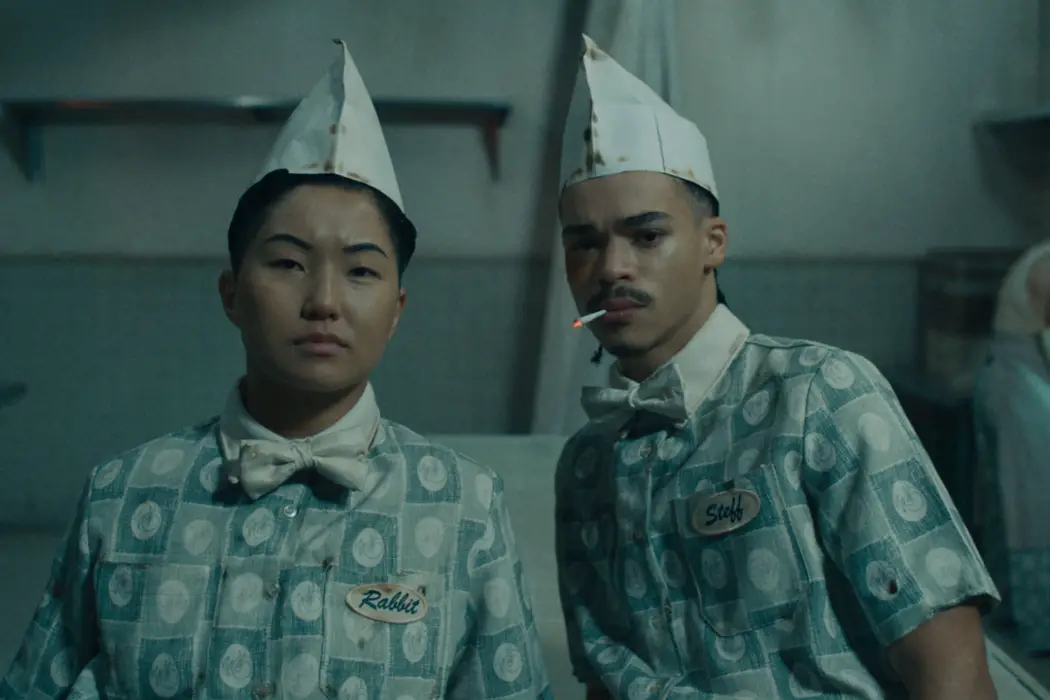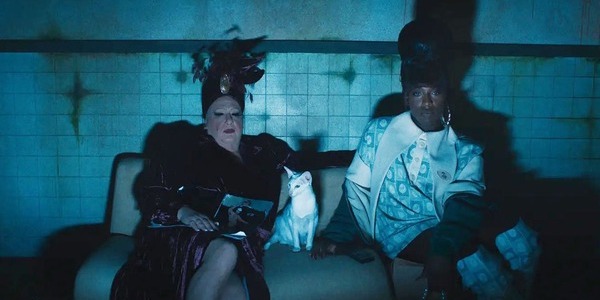Tribeca Film Festival 2023: PLAYLAND

Payton McCarty-Simas is a freelance writer and artist based in…
Playland, Georden West‘s experimental piece of queer fabulation, is an atmospheric collage befitting of its title. West and their cast perform a conjuring act both literal and phantasmagoric as they summon up memories of queer nightlife past using the titular bar as their stage and subject. The Playland Café operated in Boston from 1937 until its closure in 1998, with brief interludes of forced closure due, at least in part, to homophobic backlash from its neighbors in the area, as snatches of staticky voiceover inform us in the film’s opening sequence. Located in what became known in the 1960s as the Combat Zone, the center of Boston’s adult nightlife district for several decades, Playland is a eulogy for the uncommonly diverse communities of solidarity and necessity formed around this bar and burlesque club. As the film interweaves the fractal and elusive stories of subjects across the bar’s life, staged as a play in a series of era-specific acts, pasts eventually meet to dance, kiss, and grieve together.
Friendly Hauntings
Playland recalls, too, a history of queer and avant-garde filmmaking: it evokes the work of Jack Smith in its free associative drag performances and displays of sexuality (a shot from the Kinsey institute archive of an early 20th century erotic scene recalls Flaming Creatures), Man Ray and Buñuel in its dances with surrealist fantasy (a dishwasher drags a jukebox across the floor with rope in a fragment evocative of Un Chien Andalou), and, most centrally, the work of Guy Maddin in its structure and aesthetics, from its silent film-style title cards to its layered, ambient audio-landscape to its gorgeous, textured, elegantly scrappy production design by Kristen Dempsey and Leslie Travers. Dialogue is rare in the film, diegetic conversation even rarer. Instead, it uses interviews with real patrons and employees, paired with archival snippets of radio, television, and music to guide its performances through each flight of fancy.

Witness and interactivity also play a central role for the duration of the film, inviting active viewership and participation from the audience. West begins the film with an act of showmanship that sets the tone for the film’s carnivalesque series of performances: Danielle Cooper (Pose) arrives first, clad in a three-piece leather suit as Lady, the bar’s bouncer-cum-ringleader, holding up a finger and looking directly to the camera as she holds up a coin as if to make it disappear, flipping it between her fingers. As we watch her watching us, the sound fills the space like an orchestra warming up. She smiles.
Other characters follow suit – in one particularly evocative scene, the swinging door to the kitchen opens and closes rhythmically, revealing in flashes different era’s inhabitants preparing meals, dancing together, deep in conversation we can’t hear. Characters glance out, curious to see who’s on the other side of history peering in. Some of the vignettes in Playland are wonderfully haunting, using its single location to the superb effect: at one point, a vintage car makes an appearance, the light reflecting off the silvery backstage curtain amplified to create a rainy atmosphere as new lights glint fleetingly off the windshield to suggest movement in the still darkness of the space; coins cascade down onto a performer’s umbrella, creating a downpour; single, gliding camera movements smoothly span decades of performers, elegantly embodying the flow of history.

Snatches of Conversation
While confidence in an engaged audience serves the film well, allowing a more experimental approach to its subject matter, Playland’s loose, somewhat opaque style does sometimes leave tantalizing questions underexplored. Fascinating exposition about the bar’s role in Boston’s urban renewal and gentrification, its patron’s involvement in the Civil Rights Movement (the city’s violent conflicts over bussing for example), and its relationship to crime both organized and disorganized are only fleetingly touched upon through snippets of audio that are at times underdeveloped and can sometimes be genuinely hard to parse – static and echo certainly aid the film’s atmosphere, but do make understanding what people are saying harder. The overall effect is successful and the stylistic choice well taken, leaving one with the impression of snatches of conversations overheard in a crowded bar, but the documentary elements are so compelling that more development appears both possible and potentially beneficial, particularly given the film’s slim 72-minute runtime.
Conclusion
Overall, though, the spell Playland casts over its subject matter, an act of poetic reanimation, carries over to its viewers. The ephemeral lives of unsung queer elders are brought once again to life in all their finery, in anger as well as love, to dance and to play, in Playland.
Watch Playland
Does content like this matter to you?
Become a Member and support film journalism. Unlock access to all of Film Inquiry`s great articles. Join a community of like-minded readers who are passionate about cinema - get access to our private members Network, give back to independent filmmakers, and more.
Payton McCarty-Simas is a freelance writer and artist based in New York City. They grew up in Massachusetts devouring Stephen King novels, Edgar Allan Poe stories, and Scooby Doo on VHS. Payton holds a masters degree in film and media studies from Columbia University and her work focuses on horror film, psychedelia, and the occult in particular. Their first book, One Step Short of Crazy: National Treasure and the Landscape of American Conspiracy Culture, is due for release in November.













